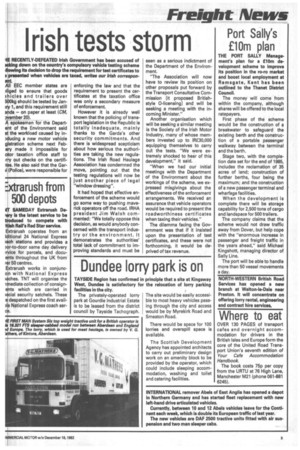Irish tests storm
Page 7

If you've noticed an error in this article please click here to report it so we can fix it.
H RECENTLY-DEFEATED Irish Government has been accused of ng down on the country's compulsory vehicle testing scheme g Its decision to drop the requirement for test certificates to presented when vehicles are taxed, writes our Irish correspon I EEC member states are A ged to ensure that goods 3 icies and trailers over kg should be tested by Jan1, and this requirement still ds — on paper at least (CM, ember 20).
spokesman for the Departs of the Environment said the wortload caused by in) ucing a new motor vehicle g stration scheme next Feb a made it impossible for r taxation office staff to ir out checks on the certifis, He also said that the Gar d (Police), were responsible for enforcing the law and that the requirement to present the certificates at the taxation office was only a secondary measure of enforcement.
However it is already well known that the policing of transport legislation in the Republic is totally inadequate, mainly thanks to the Garda's other security commitments, And there is widespread scepticism about how serious the authorities are taking the new regulations. The Irish Road Haulage Association has condemned the move, pointing out that the testing regulations will now be just another piece of legal "window dressing".
It had hoped that effective enforcement of the scheme would go some way to pushing maverick operators off the road. 1RHA president Jim Walsh commented: "We totally oppose this decision, as would anybody concerned with the transport industry or the environment. It demonstrates the authorities' total lack of commitment to improving standards and must be seen as a serious indictment of the Department of the Environment.
"The Association will now have to review its position on other proposals put forward by the Transport Consultative Commission [it proposed Britishstyle 0-licensing] and will be seeking a meeting with the incoming Minister."
Another organisation which will be seeking a similar meeting is the Society of the Irish Motor Industry, many of whose members invested up to IRE30,000 equipping themselves to carry out the tests. "We were extremely shocked to hear of this development," it said.
"When we had our initial meetings with the Department of the Environment about the workings of the scheme, we expressed misgivings about the effectiveness of the enforcement arrangements. We received an assurance that vehicle operators would be required to present the roadworthiness certificates when taxing their vehicles."
The dilemma facing the Government was that if it insisted upon the presentation of test certificates, and these were not forthcoming, it would be deprived of tax revenue.




































